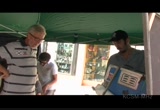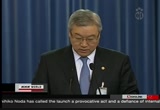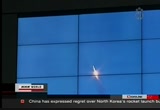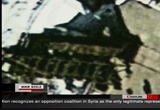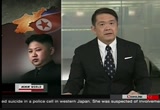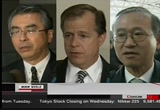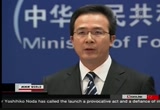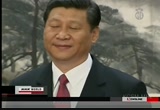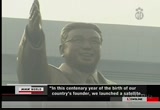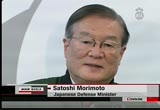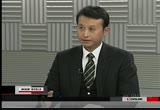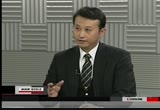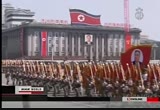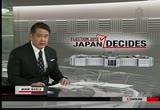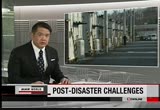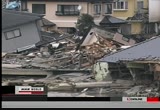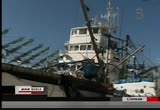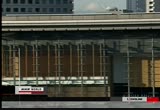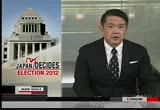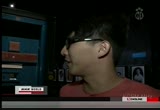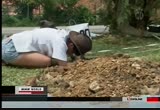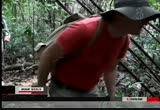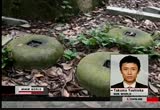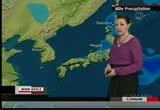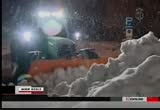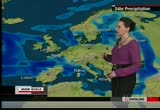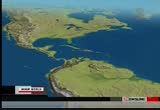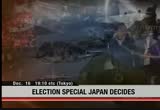tv Newsline 30min KCSMMHZ December 12, 2012 6:00am-6:30am PST
6:00 am
liftoff. north korean space officials succeed in carrying out their latest launch saying they put a satellite in to space. welcome to nhk world "newsline." north korea is once again the talk of leaders and major capitals around the world. the country is facing condemnation for its latest high-profile move. north korean authorities say they used a rocket to put a
6:01 am
satellite in to orbit. >> translator: japan asked moroco to start discussion on the launch in the council. we would like to deal with this issue civilly by cooperating with the international community. >> translator: north korea's action is threatening the peace and security of the korean peninsula, as well as the world. we strongly denounce the launch of the missile in defiance of repeated calls and warnings by the international community. >> krt made public a picture of what they say is a control facility for the satellite. officials in south korea, japan and elsewhere say the north koreans fired off a long-range missile. japanese government officials say it traveled south over okinawa. they say the launch went at the north koreans had predicted. the first stage fell in to the
6:02 am
yellow sea. the nose section fell a short distance beyond that. the second stage dropped in to the pacific ocean east of the philippines. japanese defense officials say they learned of the launch from u.s. missile warning systems around 9:51 japan time. it was confirmed around 10:01 by self defense forces radar which then tracked the rocket. the ministry says it decided not to fire its patriot defense missiles because the rocket was confirmed to pass over okinawa toward the pacific ocean. the officials say there was no possibility of debris falling on japanese territory. south korea's defense ministry says the rocket that north korea launched on wednesday could have reached as far as the u.s. west coast. >> translator: the rocket launched today must be a long-range missile with an estimated range of about 10,000 kilometers. >> kim said the launch was aimed
6:03 am
at furthering the development of intercontinental ballistics missiles. the launch had officials scrambling to catch up. north korean authorities announced monday they were extending the launch window by a week because of problems. south korean officials said their intelligence suggested a delay. they said north korean crews removing the missile from a launch pad possibly to repair it. they told nhk the technical problems didn't just affect the first stage control engine module. that possibly the entire system. but after the launch, south korean defense ministry spokesperson kim minsuk said the information had not been officially confirmed despite the fact it came from the government. commanders of japan's self defense forces put their personnel on high alert for the duration of the launch window which ended december 29th. north koreans said liftoff would
6:04 am
happen one day before noon. that didn't stop them from heading to okinawa wednesday morning. chief of staff flew back to a base west of tokyo right after the launch. self defense force representatives haven't disclosed whether they detected any early warning signs. defense ministry sources have told nhk they thought the launch would likely be delayed illustrating the difficulties of intelligence gathering and analysis on north korea. japanese missile expert explained the difficulty of analyzing military intelligence. he is a former maritime self defense admiral. he analyzed the launch. he pointed out the difficulties involved in the analysis done on the timing of the launch. >> translator: a satellite photo of an extra missile taken out of the storage site could have been seen as the missile being put in to the storage vehicle. analysts apparently
6:05 am
misinterpreted the photographic data and failed to predict the launch. >> koda said north korea may have been testing how the network worked by firing the rocket a time they didn't expect. senior government officials of japan, the united states and south korea are coordinating the respon response. they say they'll pursue strong action through the u.n. security council. the head of the japanese affairs bureau spoke by phone with the u.s. special representative on north korea, glen daveys and south korea's chief negotiator. they agreed that the launch clearly violates u.n. security council resolutions that ban north korea from launching any rockets using ballistic missile technology. japanese ambassador to the u.n. said he has asked the security council to take up the issue. the council has decided to hold an emergency meeting on wednesday.
6:06 am
the world has been focusing on one of north korea's few allies in asia. nhk world's takafumi reports from beijing on china's response. >> reporter: chinese foreign minister spokesperson condemned the launch in a routine news conference. >> translator: it's regrettable that north korea went ahead with the launch despite the international community's close attention. as a member of the united nations, the north has the obligation to respect security council resolutions. >> reporter: but the chinese official expressed a kosher stance toward additional sanctions against the north. china urged north korea to exercise self-restraint. its officials had expressed hope the north would behave cautiously from the broad per suspect i of peace and stability on the korean peninsula. that the leadership in pyongyang did not heed that call and went ahead with the launch anyway.
6:07 am
it demonstrates that china's influence on the north is limited. it should be noted here that china has been calling for more action from other countries. its contention is that the rest of the world should act to prevent tension on the peninsula from escalating further. china is apparently concerned that strong international criticism will cause north korea to take an even harder stance. beijing believes that would wipe out any chance of a breakthrough in resolving the situation. it appears china's officials will now move to control the damage. they'll be trying to use what influence they do have over their lie to prevent more provocative acts from north korea. nhk world, beijing. >> north korea's state-run television declared the launch a success.
6:08 am
>> north korea's state-run news agency says the satellite entered orbit on schedule about ten minutes after the launch. it's reportedly fitted with observation instruments, the news agency says the orbit is around 500 kilometers above the earth. >> news of the launch was announced in north korea only after its success was confirmed. people at this hotel in pyongyang applauded when they heard north korea had put a satellite into orbit. >> translator: i felt very proud to be north korean when i heard about the news. i realized scientific technology of my country has reached the highest level.
6:09 am
>> translator: our late commander kim jong-il would be so happy to hear that the launch was successful. i'm sure that by following the instructions of kim jong-un our country will become strong and prosperous. the launch given officials around the world a lot to think about. japan's defense minister says his country needs to equip itself against developments. >> translator: we have to admit that north korea's missile technology is improving. this will pose various security problems to japan. as well as other countries in the region. >> he says the launch shows japan must maintain a sophisticated and effective missile defense system. security analysts are busy
6:10 am
examines what the north koreans have achieved. 32 years in the maritime self-defense force. nhk's shery ahn spoke with him earlier. >> defense minister said that north koreans' technology seems to be quite advanced. what do you think they improved upon? >> of course. north korea is improving the missile technology continuously and they got the basic technology of ballistic missile now. usually the improving the technology is for extending the range of missiles. very roughly say much fuel makes long range but it's not so easy because combustion must be controlled. and also, the attitude of missiles must be controlled, too. it needs high technology. so i think they use basically the same technology from the missile, which was launched last
6:11 am
april. they say it was improved which has 6,000 kilometers range. >> what is puzzling is that north koreans and japanese officials said the missile was removed from the launch pad so what do you make of that? >> if north korea really removed missile of launch pad, i think there are two possibilities. one is the fake. north korea didn't want neighboring countries to observe the launch itself accurately because they didn't have the self-confidence of placing the orbit satellite into the -- sorry. the object into the orbit. one another is they used spare.
6:12 am
if they prepared spare rocket then they use spare rocket to launch the missile. >> all very strategic. >> yes. >> now, what should the japanese government do in terms of security? >> yes. japan has to cooperate with united states and south korea to detect a sign of missile launch. so japan has to consider about deployment of ships into the japan sea, japanese sea. also has to keep a lot condition of the pac-3 unit and also has to consider about how to treat the missiles, ballistic missiles, if north korea launched. japan has to consider about, how
6:13 am
to respond the united states requirement. if united states gets japan to destroy the missile in the very early stage of the launch. it must be the 3s program for the japanese government. people all over japan have been hearing from their politicians lately, on tv, on radio, and on the street. campaigning for this sunday's general election is reaching its climax. leaders of the coalition that has governed in country more than three years are asking for a second chance. when japan decides, voters will be picking lawmakers for the lower house of the diet. they will use ballots to keep the ruling democrats in power or to send them packing, allowing another party or parties to form the next government. these 12 groups met the criteria to be called a political party
6:14 am
in this election. they include long-established parties and several new on that were just founded. a number of other groups failed to meet the standards but are still fielding candidates. one of the biggest challenges the next government will have to face is the reconstruction of japan's northeast. the earthquake and tsunami last year devastated the region and triggered a nuclear accident. more than 18,000 people have been confirmed dead or missing. more than 300,000 others can't go home or have no home to return to. nhk world's junio motosoto looks at the state of things nearly two years on. >> reporter: a bitter cold grips a temporary housing site. this family is starting their second winter here. if 74-year-old couple used to run a noodle shop for nearly half a century.
6:15 am
but the march 2011 disaster destroyed their life's work. they're calling their business their home. they say now they are too old to find work. >> translator: we're left in poverty. people living on an income may get along. what can jobless people like us do? we have no savings either. >> reporter: the disaster changed the life for the suzukis and tens of thousands of others. the waves swallowed towns and sparked a nuclear accident that contaminated a widespread area. mountains of debris layers the land. the democratic-led government has been criticized for how the disaster was happened. what happened on march 11, 2011, was japan's worst crisis since the end of world war ii. any political party would have struggled.
6:16 am
nearly two years on, politicians and workers have made some progress. but there is still so much to do. workers have the fukushima plant under control. but decommissioning the facility will take decades. crews have been decontaminating towns and villages near the plant. however, the lack of storage sites for contaminated soil is delaying the cleanup. people are back to work at major fishing ports in the most severely damaged prefectures. iowaty, miyagi and fukushima. towns are now 80% of what they were before the disaster. but thousands of people are still out of work. rebuilding the communities the tsunami washed away is another challenge. the suzuki's noodle shop used to stand here. other shops and houses stood
6:17 am
beside it. government officials have designated the land a tsunami danger zone. no one can live or run a business here. suzuki and his wife aren't sure where they will go next. >> translator: we have to think about what we'll do when it's time to leave. >> reporter: the government has set aside about $230 billion for reconstruction, but it's faced criticism, because some of the money has been used for other projects, leading to more frustration among people who feel they have no prospects for the future. >> translator: the government must speed up reconstruction and respond to the needs of the affected people. >> translator: politics won't change. whoever becomes the leader. i don't know who to vote for.
6:18 am
>> translator: i want politicians to stop wasting tax revenues and prioritize, helping elderly people find new homes. >> reporter: the suzukis, like others in their region, face a future of hardships and not sure which political party will be able to make things better. jun yotsumoto, nhk world. our coverage leading up to sunday's general election continues all this week. we'll focus thursday on an economic issue that's proven divisive. whether japan should join the negotiations for a massive free trade agreement, transpacific partnership. japan's ruling party promised change when it took power in 2009 but it faced challenges. a natural disst ear ennuclear accident. an economy dogged by uncertainty. and disputes with neighbors over
6:19 am
territories. voters now face a choice. who will they trust in guide their country forward? join us december 16th for "japan decides." forgive but never forget. that's the slogan singapore has adopted toward the occupation by imperial japan during world war ii. 2012 has marked 70 years since japanese forces grabbed control of the former british colony. today, singapore and japan maintain friendly relations, but efforts are under way to make sure young singaporeans never forget their nation's history. nhk world has a report. >> reporter: the national museum of singapore documents the history of the city state. on the 70th anniversary of japan's occupation, a new
6:20 am
exhibition on world war ii. displays include sensitive issues, such as the killings of residents by japanese soldiers who suspected them of supporting the resistance in china. photographs and mementos honor the victims. another section recalls japanese national who saved the lives of many detainees. >> it's very impactful. because it shows all the photos and tells the stories through pictures and the artifacts. it's important to know about stuff that's happening in singapore. >> reporter: singapore was a british colony when it was occupied by the imperial japanese army one year into world war ii. military rule lasted for three years until japan's surrender.
6:21 am
67 years later, university students join a team led by a british ex parte researching wartime battlefields. they uncover bullets and parts of gas masks at sites where british and japanese forces fought harsh battles. this student studies archaeology and enjoys the benefits of modern life in singapore, but at the same time, she wanted to learn about harder times that her grandparents lived through. >> it's important to know about what happened and why it happened and the events that led to it, because it will teach us that the future generations not to make the same mistake.
6:22 am
>> reporter: the team heads for ruins of a shintu shrine built by the japanese during the war. it was a place of worship for japanese soldiers and civilians. for local people, it was a symbol of the occupation. after the war, the shrine was dismantled. nature has reclaimed the site. students venture deep into the forest to look for what remains. they walk for 40 minutes to find the clearing and what appears to be the entrance of the shrine. >> what is this? >> this is the granite boulder. 10,000 p.o.w.s cut --
6:23 am
>> reporter: the main hall and gate are gone. all that remains a stone basin where visitors purified themselves before praying. the visit makes zhan jinggyi wonder what life was like back then. >> seeing it for yourself, it kin of creates like that feeling it would be more worthwhile, learning history in this way. >> reporter: memories of the war are fading. but these young singaporeans hope that looking to the past will equip them with valuable lessons for the future. takumyoshioka, nhk, japan. it's been snowing heavily in japan, but some of the white stuff is tapering off. rachel ferguson here with weather. looks like things easing up a bit in snow country. >> yes, indeed, they are and it's because we have a new system coming in and in front of it, some warmer winds coming up from the south. this is the system, first of all, before it reaches japan it will be bringing showers across
6:24 am
central and northern china. now actually, there will be a stationary front developing here just across central china, to the north, beijing area, you will probably going to be seeing snow. not so much it will accumulate. ahead of this system, warmer winds will move across the peninsula and come in to japan, as well so that heavy snowfall we've been seeing is starting to taper off now but as there's just going to be a short break and then see the rain coming in but that's going to impact the snow melt. now at the moment, the snow depths are, well, as we have here, this is wednesday evening so the most recent figures. still seeing amounts of up to a meter, surpassing a meter in the sea of japan side of the country. two meters of snow stacked up usually seeing 30, 20 centimeters for the month of december. it is going to start to melt and that brings with it its own travels. avalanche advisories are posted
6:25 am
across much of that western edge of the country. so here are your temperatures as we head on in to thursday. 1 degrees in beijing and 4 towards seoul. 22 in taipei. these temperatures are three or four degrees warmer than in recent days. we're starting to see that warmer weather come through. all right. i want to take you now to europe. central locations enjoying peaceful weather at the moment but a big storm moved through and i want to show you what happened in austria. the snowplows are out in force here but unfortunately lots of cars and trucks slid off the roadways and this resulted in widespread road closures. at the same time, towing services were having to work very long hours as you can see. cars there just in the ditch really dreadful situation. thankfully the fair weather has moved in as this storm moves off to the east and has to move
6:26 am
somewhere and see it here pushing in towards western russia. the front is going to be bringing mountain snow towards the north of turkey but the south of turkey is seeing more heavy rain. very unwelcomed rain. the southwest has been getting a drenching this week. now, out towards the west we have another system coming in. precipitation coming in across the western british aisisles ann towards france and spain. this is going to be rain rather than snow getting warmer here. the frigid air to the east. tomorrow on your thursday, 2 degrees in london. 1 degree in paris but in to friday the temperatures rebound to averages. about 11 degrees for you in london so it's feeling warmer i should say. out towards the east, we have plenty of sub zero temperatures for the highs. minus 5 in stockholm. minus 5 in warsaw and minus 3 in vienna. i'll leave you now with your extended forecast.
249 Views
IN COLLECTIONS
KCSMMHZ Television Archive
Television Archive  Television Archive News Search Service
Television Archive News Search Service 
Uploaded by TV Archive on

 Live Music Archive
Live Music Archive Librivox Free Audio
Librivox Free Audio Metropolitan Museum
Metropolitan Museum Cleveland Museum of Art
Cleveland Museum of Art Internet Arcade
Internet Arcade Console Living Room
Console Living Room Open Library
Open Library American Libraries
American Libraries TV News
TV News Understanding 9/11
Understanding 9/11